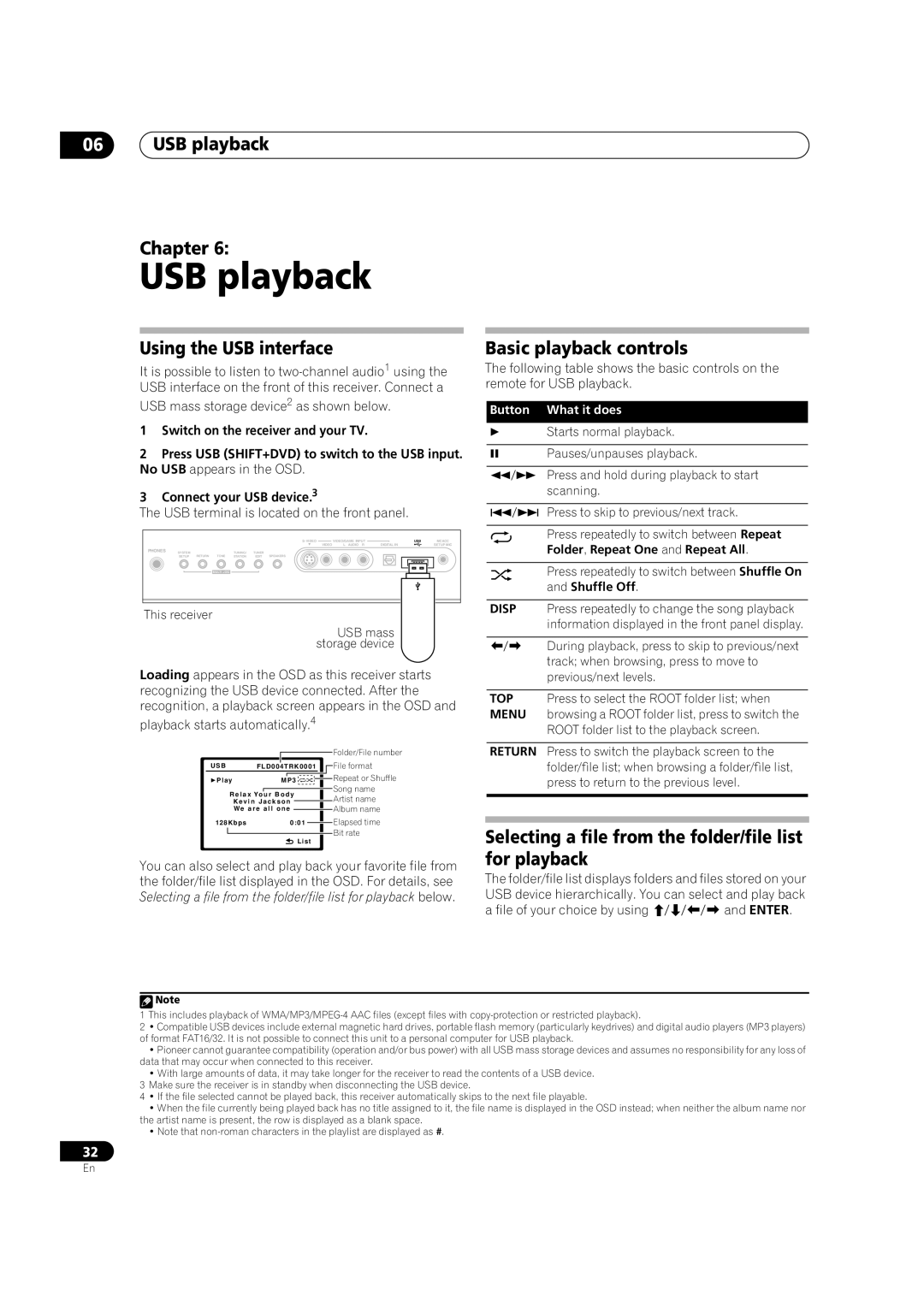
06USB playback
Chapter 6:
USB playback
Using the USB interface
It is possible to listen to
USB mass storage device2 as shown below.
1Switch on the receiver and your TV.
2Press USB (SHIFT+DVD) to switch to the USB input. No USB appears in the OSD.
3Connect your USB device.3
Basic playback controls
The following table shows the basic controls on the remote for USB playback.
Button What it does
Starts normal playback.
Pauses/unpauses playback.
Press and hold during playback to start scanning.
The USB terminal is located on the front panel.
Press to skip to previous/next track.
Press repeatedly to switch between Repeat
PHONES
|
| VIDEO/GAME INPUT |
|
| USB | MCACC | |
| VIDEO | L AUDIO R | DIGITAL IN |
| SETUP MIC | ||
SYSTEMTUNING/ TUNER
SETUP RETURN TONE STATION EDIT SPEAKERS
MULTI JOG
Folder, Repeat One and Repeat All.
Press repeatedly to switch between Shuffle On and Shuffle Off.
This receiver
USB mass storage device
Loading appears in the OSD as this receiver starts recognizing the USB device connected. After the recognition, a playback screen appears in the OSD and
playback starts automatically.4
|
|
|
|
|
|
|
|
|
|
|
|
|
|
| Folder/File number |
|
|
|
|
|
|
|
|
|
|
|
|
|
|
| |
| USB | FLD004TRK0001 |
|
|
|
| File format | ||||||||
| Play |
|
| MP3 |
|
|
|
|
| Repeat or Shuffle | |||||
|
|
|
|
| |||||||||||
|
|
|
|
|
|
|
|
|
|
|
|
|
|
| Song name |
|
| R e l a x Yo u r B o dy |
|
|
|
| |||||||||
|
|
|
|
|
| Artist name | |||||||||
|
| Kev i n J a ck s o n |
|
|
|
|
|
| |||||||
|
|
|
|
|
| ||||||||||
|
| We a r e a l l o n e |
|
|
|
|
|
|
| Album name | |||||
|
|
|
|
|
|
| |||||||||
| 128Kbps | 0:01 |
|
|
|
|
|
| Elapsed time | ||||||
|
|
|
|
|
| ||||||||||
|
|
|
|
|
|
|
|
|
|
|
|
|
|
| Bit rate |
|
|
|
|
|
|
|
| List |
|
|
|
| |||
|
|
|
|
|
|
|
|
|
|
|
|
| |||
|
|
|
|
|
|
|
|
|
|
|
|
|
|
|
|
You can also select and play back your favorite file from the folder/file list displayed in the OSD. For details, see Selecting a file from the folder/file list for playback below.
DISP Press repeatedly to change the song playback information displayed in the front panel display.
During playback, press to skip to previous/next track; when browsing, press to move to previous/next levels.
TOP Press to select the ROOT folder list; when MENU browsing a ROOT folder list, press to switch the
ROOT folder list to the playback screen.
RETURN Press to switch the playback screen to the folder/file list; when browsing a folder/file list, press to return to the previous level.
Selecting a file from the folder/file list for playback
The folder/file list displays folders and files stored on your USB device hierarchically. You can select and play back
a file of your choice by using | and ENTER. |
![]() Note
Note
1This includes playback of
2• Compatible USB devices include external magnetic hard drives, portable flash memory (particularly keydrives) and digital audio players (MP3 players) of format FAT16/32. It is not possible to connect this unit to a personal computer for USB playback.
•Pioneer cannot guarantee compatibility (operation and/or bus power) with all USB mass storage devices and assumes no responsibility for any loss of data that may occur when connected to this receiver.
•With large amounts of data, it may take longer for the receiver to read the contents of a USB device.
3Make sure the receiver is in standby when disconnecting the USB device.
4• If the file selected cannot be played back, this receiver automatically skips to the next file playable.
•When the file currently being played back has no title assigned to it, the file name is displayed in the OSD instead; when neither the album name nor the artist name is present, the row is displayed as a blank space.
•Note that
32
En
